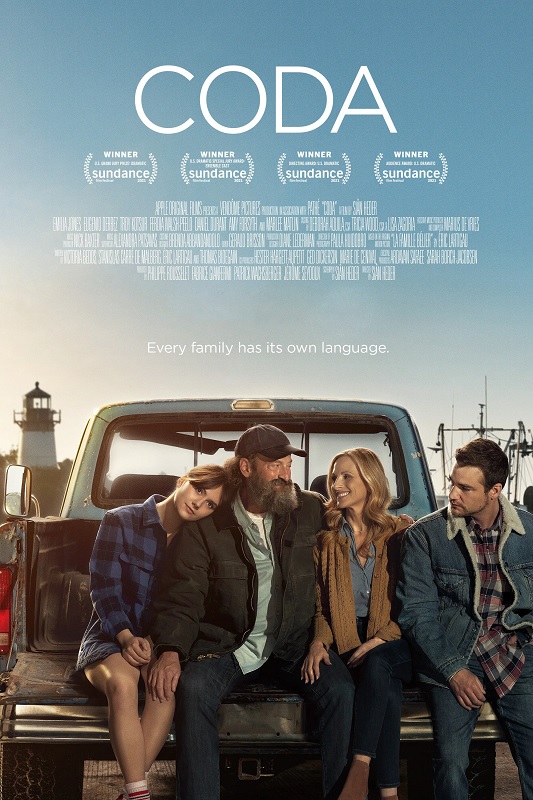

CODA – 2021
Well, another year of fantastic movies has come and gone, and another film has taken the top prize. This year, it is a smaller, more intimate film. It is a bit of a niche film, focusing on a very small group of people who, like all minorities deserve to have representation and a voice. That group is actually named in the title of the film. CODA is an acronym that stands for child of deaf adults. So it is appropriate that the film is a coming-of-age story about a girl who can hear being raised in a completely deaf household.
Interesting topic? Sure, why not? But powerful or deep? Not particularly. There was never much conflict in the film, so the victories were never too sweet, nor were the defeats too traumatic. The young girl’s name is Ruby, played by Emilia Jones. She grows up in a loving household with loving parents, Frank and Jackie, wonderfully played by Troy Kotsur and the always amazing Marlee Matlin. She even gets along with her supportive brother, Leo, played by Daniel Durant.
There were only three other characters in the movie that really affected the plot. First was Gertie, Ruby’s best friend, played by Amy Forsyth. Next was Miles, Ruby’s love interest, played by Ferdia Walsh-Peelo. And finally, there was Bernardo Villalobos, Ruby’s choir teacher, played by Eugenio Derbez, otherwise known as Mr. V. So the cast was small, the drama was small, and the story itself was small… I’m sorry, but if I was an Academy voter, I wouldn’t have voted for CODA. I mean, as a film, it was good, but I don’t think it was great.
It just didn’t have enough power. Now, I know, power is not a necessity for a Best Picture winner. There have been other small films that have taken home the Oscar for Best Picture, that were completely deserving. But now that I’ve seen all the other movies that were nominated this year, I think I would have voted for King Richard. It was just a more engaging movie. CODA was too mild, too predictable, and just too small. But I don’t want it to sound like I didn’t enjoy the movie, because I did. I just enjoyed the other film more.
So what was it about CODA that earned it the Best Picture Award? Well, for one thing, it was the positive representation of the deaf characters. When most of us think of deaf people, we think of them as being handicapped, almost putting them on the same level as blind people, people who have a certain level of difficulty functioning in normal society. But CODA, while it is really Ruby’s story, is almost more about showing the audience how normal, functional, independent, self-sufficient, and capable deaf families really are. There were times in the film where Ruby’s story, the main plot of the film, felt almost secondary, as if the film was about this deaf family and the difficulties they faced, instead of a coming-of-age movie. And I don’t think that was intentional. Fortunately, that didn’t happen too often, but it did happen.
In a mild little twist to the overall narrative, Ruby, whose parents and brother are deaf, finds that she has talent as a singer. As she learns to develop her talent, she starts to learn that she can have a life outside of being her family’s interpreter, their connection with the speaking world. As a result, she feels torn between her loyalty to her family who depends on her, and her desire to become her own person.
One of the most interesting things in the film was a scene where Ruby is trying to express her love of singing to her mother, who is dismissive of Ruby’s feelings. Jackie mistakenly sees Ruby as a daughter who is just being rebellious. She even asks, “If I was blind, would you want to paint?” As a mother, she doesn’t understand that her daughter’s aspirations are not about herself. But again, the fight never got too intense. It was a simple argument, and there was no schism in their relationship.
One of the themes in the movie was that Ruby had a difficult childhood. The popular girls made fun of her because of her family. But Ruby seemed to deal with them in a mature fashion, so no real conflict there. Although, I did find it interesting to learn that many CODAs face a similar problem in school. During their early years, they do not have parents who can teach them to speak. They learn sign language, but when they make it to school, they can’t speak like the rest of the children. I’ve never thought about that, but it makes sense. Actually that might have made for a more interesting story, one about a CODA going through that struggle. But that would be a different movie.
Another little interesting fact was touched on, and that is that deaf people cannot enjoy music, a misconception that many people believe. In fact, they can, just not in the same way that hearing people can. For example, Frank liked rap music because of the heavy base that can be felt. But the movie touched on a number of those little details about deaf people that I actually never gave much thought to. The problem is that while those little facts were interesting, they weren’t terribly engaging or draamatic.
So again, I come back to the question, why was this film given so much acclaim? And the only answer I can come up with it the quality of the acting. To start with, It is important to note that Troy Kotsur won the Academy award for Best Supporting Actor. He really did a fantastic job. There is a great scene where Frank and Jackie go to see Ruby perform in a concert. There is a moment when Ruby is singing a duet with Miles. The camera pans around Frank and the sound cuts out. At first I thought the look on his face was confusion. But that wouldn’t make sense. He knows what being deaf is. So really it was a complex combination of wonder, understanding, and acceptance, as he sees how the other members of the audience have a real emotional response to his daughter’s voice in a way he thinks he cannot. But then later that night, he asks Ruby to sing the song for him as he puts his hands on her throat, and feels the vibrations made by her voice. He is nearly brought to tears, and it was a beautiful scene.
Interesting note: As a well-known actress who happens to be deaf, Marlee Matlin was the first cast member brought on board. When the producers wanted to hire hearing actors to play other deaf roles, Matlin threatened to pull out of the film, insisting that they hire deaf actors to play opposite her. Good for her.
And Matlin is one of those actors who I’ve always loved. I don’t think of her as a deaf actor. I think of her as an actor who happens to be deaf. What I mean is that she is a very talented actress, first and foremost. The fact that she is deaf is inconsequential. She is just a great actress. If you have any doubt of that, just watch her in 1986’s Children of a Lesser God, or even one of my favorite TV shows, The West Wing.
And finally, there was the third actor who was deaf, Daniel Durant. I loved him and I loved his character. He was the first in his family to stand up for Ruby’s desire to be a singer, saying that the family could get by without holding her back by insisting that she stay with them forever to be their link to the hearing world. He recognized that such a situation was only in the family’s best interest, and not in Ruby’s. He is the one who pushed her to follow her dream, even if it took her away from them. He played a young man who wanted the world to deal with him on his own terms, and not the other way around. And I have to say, he was pretty nice to look at, too. I liked how they romantically paired him up with Ruby’s friend Gertie.
There’s something else I liked about the movie that I think needs to be mentioned. The family was a professional fishing family. They owned their own boat. However, there was a scene in which they are fishing, and Ruby isn’t with them. When the Coast Guard tries to contact them on the radio, and even when they approach them in the water, Frank and Leo cannot hear them approach. Because of this, their fishing license is suspended. The film almost tries to make us feel sorry for them, but I have to applaud the reality of that situation. And the reality is that if you cannot hear the Coast Guard, then you are a potential danger to yourselves and to others. But I think the point of the scene was that either Ruby should have been with them, or they should not have gone fishing. It emphasized how much they depended on Ruby for their living, no matter what she wanted for herself.
Interesting note: According to Wikipedia, there was a certain amount of criticism from the deaf community, itself, saying that “The film’s depiction of the hearing child interpreting for her parents even in settings where professional interpreters would be required by the Americans with Disabilities Act of 1990, such as a court hearing and medical appointments, received widespread criticism as being misrepresentative.”
But I have to remind myself that this wasn’t a movie about the challenges faced by deaf people. It was a coming-of-age story. And what’s one of those without a young romance. But I’m sorry. The romance wasn’t particularly intense, passionate, sweet, or even engaging. It was there, and it was nice. But unfortunately, I didn’t get much out of it. There was an amusing moment where Ruby and Miles are in her room practicing their duet when they hear Frank and Jackie having sex. Being deaf, they weren’t particularly aware of just how loud they were being. Ruby is forced to interrupt them by going into the room and flashing the lights on and off. Not knowing what else to do, Frank and Jackie sit Ruby and Miles down and tell them, in sign-language, to use protection when they have sex. It was a pretty funny scene.
And lest I forget, I have to talk about the character of Mr. V. I can’t decide if I liked him or not. As a teacher, he was kind of a jerk, at first. He talked down to the students and came close to making fun of them individually during the first choir class. I didn’t like him until he decided to take Ruby on as a personal voice student. Then, he was very unsympathetic about her and her personal situation. But in a way, that, at least, was realistic. I have been in choirs all my life, and most of them, from school teachers to professional directors, have the opinion that if you are in their choir, then your commitment to the choir comes first, before everything else in your life. If it is the most important thing to them, then it should be the most important thing to you. Fortunately, by the end of the movie, we end up liking him.
Interesting note: In doing a little reading about the film, I found it interesting to learn that they are planning a stage version of the movie, and of course, they want it to be a musical.
That being said, yes, there was music in the film. There had to be, as Ruby’s whole story arc revolves around her being a singer. As for that, Emilia Jones and Ferda Walsh-Peelo did their own singing, and I have to say I was rather unimpressed with their voices. They weren’t bad, but I think I would place them on the high end of average. When Ruby goes to her big audition to get into Berkley School of Music, she sings a song which I have always liked. She sang Both Sides Now by Joni Mitchell. I’ve always loved the gentle and yet almost profound lyrics. It is a beautiful song, and Jones sang it competently. I question whether an admissions panel would allow the audition to continue if the candidate’s family is in the theatre. Maybe they would, but they shouldn’t, especially if none of the other candidates were allowed to have their families there.
So she signs the lyrics to the music, and sings to her family, which gives her the confidence to sing the song beautifully. And lo and behold, she makes it into Berkley School of Music. That was a bit predictable. They wanted to have that feel-good ending. They wanted that wonderful shot of the family in a group hug before she is driven away to college. It was nice, but that was about it. It just wasn’t that profound for me. I think I was supposed to get a little teary, but I just didn’t. There was nothing wrong with the ending, but it didn’t grab me like a Best Picture winner is supposed to.
Still, was it a good movie? Yes. It wasn’t great, but it was good. Is it important to have positive representations of deaf people in films? Of course it is, and this one did a fine job of that. But should it have won Best Picture? Like I said… I would have voted for King Richard. Despite the important deaf angle, King Richard was just a better movie.








